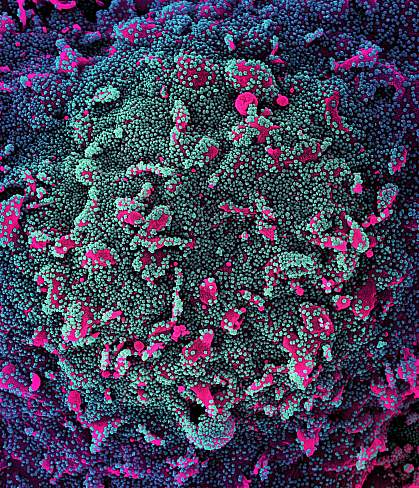You are here
July 20, 2021
Experimental vaccine protects against multiple coronaviruses
At a Glance
- By combining parts of spike proteins from different coronaviruses, researchers developed an mRNA vaccine that protected mice against a range of coronaviruses.
- The results point the way toward a universal coronavirus vaccine that could prevent future pandemics.

Three pathogenic coronaviruses have emerged in the past two decades: the severe acute respiratory syndrome coronavirus (SARS-CoV), the Middle East Respiratory Syndrome coronavirus (MERS-CoV), and SARS-CoV-2, which causes COVID-19. Both SARS-CoV and SARS-CoV-2 are Sarbecoviruses. Bats harbor other Sarbecoviruses that could spread to humans and cause future pandemics. Thus, there is a need for a vaccine that could protect against a range of Sarbecoviruses.
Some current vaccines against SARS-CoV-2, like the Pfizer and Moderna vaccines, are mRNA vaccines. These contain messenger RNA (mRNA) that directs the body’s cells to make a viral protein, which elicits an immune response. A team of researchers led by Drs. David Martinez and Ralph Baric at the University of North Carolina at Chapel Hill set out to design an mRNA vaccine that would be effective against several Sarbecoviruses.
NIH’s National Institute for Allergy and Infectious Diseases (NIAID) and National Cancer Institute (NCI) supported the work. Results were described in Science on June 22, 2021.
Sarbecoviruses attach to host cells using a protein on their surfaces called the spike protein. Current SARS-CoV-2 vaccines use the spike protein to elicit an immune response. The team hypothesized that a spike protein made with parts from different viruses would elicit a broad immune response. So, they mixed three parts—the receptor-binding domain (RBD), the N-terminal domain (NTD), and subunit 2 (S2)—from various Sarbecoviruses into single spike protein “chimeras.” They created four such chimeras using different combinations of RBD, NTD, and S2.
The researchers immunized aged mice with various combinations of mRNA encoding these spike chimeras. They also immunized mice with a vaccine containing only SARS-CoV-2 spike mRNA for comparison. Both groups of mice produced potent neutralizing antibodies against SARS-CoV-2. They also produced antibodies against the alpha and beta variants of concern.
Mice that received all four chimeras also produced antibodies against SARS-CoV, bat viruses, and additional SARS-CoV-2 variants of concern. These antibody responses were comparable to, or better than, those generated against SARS-CoV-2. In contrast, mice that received only the SARS-CoV-2 vaccine had little or no antibody response to the other viruses.
To assess whether the mice were protected against diverse viruses, the team exposed them to SARS-CoV and bat coronaviruses. Mice vaccinated with the chimeras had no detectable virus in their lungs and no lung damage. In contrast, mice vaccinated with the SARS-CoV-2 spike developed breakthrough lung infections and weight loss when challenged with other viruses.
These results suggest that a universal Sarbecovirus vaccine may be possible. The team hopes that further testing will lead to human clinical trials of a chimeric spike mRNA vaccine next year.
“Our findings look bright for the future because they suggest we can design more universal pan-coronavirus vaccines to proactively guard against viruses we know are at risk for emerging in humans,” Martinez says. “With this strategy, perhaps we can prevent a SARS-CoV-3.”
—by Brian Doctrow, Ph.D.
Related Links
- Nanoparticle Vaccine Against Various Coronaviruses
- Experimental Coronavirus Vaccine Highly Effective
- Antibodies and T Cells Protect Against SARS-CoV-2
- Potent Antibodies Found in People Recovered From COVID-19
- Llama Antibody Engineered to Block Coronavirus
- Novel Coronavirus Structure Reveals Targets for Vaccines And Treatments
- Coronavirus (COVID-19)
- COVID-19 Prevention Network
- Coronavirus (COVID-19) (CDC)
References: Chimeric spike mRNA vaccines protect against Sarbecovirus challenge in mice. Martinez DR, Schäfer A, Leist SR, De la Cruz G, West A, Atochina-Vasserman EN, Lindesmith LC, Pardi N, Parks R, Barr M, Li D, Yount B, Saunders KO, Weissman D, Haynes BF, Montgomery SA, Baric RS. Science. 2021 Jun 22:eabi4506. doi: 10.1126/science.abi4506. Online ahead of print. PMID: 34214046
Funding: NIH’s National Institute for Allergy and Infectious Diseases (NIAID) and National Cancer Institute (NCI); Burroughs Wellcome Fund; Howard Hughes Medical Institute; Chan Zuckerberg Initiative; North Carolina Coronavirus Relief Fund; BioNTech
